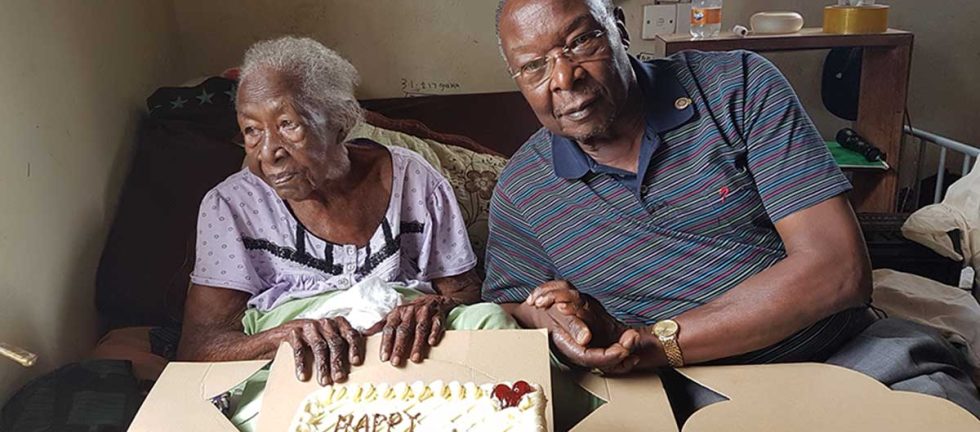I would like to mull over the challenges of growing old. We are born, and as we grow, we age or grow old. As an old man of more than 8 score years, I want to muse over the life stage I have reached. Our relationship with aging changes with age. When we are very young, we want to be seen as more grown up than we are. Very often we hear three-year-old children vehemently, but innocently, claiming that they are six years, or a two-year old claiming to be four years. At this stage of life, the claims are driven by lack of knowledge of the magnitude of the numbers claimed. Teens and young adults are too happy to be adults at last and make much ado about it. They keep fighting for their rights as fourteen or eighteen years old.
Adult and early middle-aged women are insulted if their year of birth is publicized. They would rather not receive a birthday present if it comes with an age declaration. Those who are brave will freeze their age at 40 years, the not-so brave will continue making it known that they are 29 or 30. Men are not bothered. Some may even genuinely forget their birthdays let alone their ages.
I now come to those at the door of my age group. Many old women, while they cannot claim to be 30 years old, do all they can to make themselves look younger, most times unsuccessfully. Men at the door of my age group generally do not care. Only a few, who are very vain, dye their hair, ending up looking silly with jet black hair or else they shave their heads fitting in with the existing trend.
As we age, the long view ahead can be frightening when one sees neglected old people or old people struggling to survive through a myriad of physical and social challenges. When these views are integrated into retirement views, worries of retirement, because of age, coupled with worries of old age per se, it can be extremely depressing.
First, what is old age? Age is said to be just a number. While that may not be strictly true, it helps to mitigate apprehension over aging. A lot has been written about aging and old age, contrasting economically rich countries and poor countries with the attending implications to the lives of the people. Most European countries have the age of 60 to 65 as the transition from middle to old age but in other countries, old age can begin as early as the mid-40s or as late as 70s.
All living things grow with passage of time. That cannot be escaped. The primary step in handling aging is accepting it. Acceptance involves adapting lifestyle to one’s age. If one is 30 years old, not to behave as a teenager, or if one is 60 years old not to behave as a 30-year-old. Behaviour refers to all aspects of life. Adapting lifestyle to one’s age involves being sensitive to changes in one’s body due to age. Reduced energy, joint pains and aches, memory loss and so on. Memory loss is the most classic.
We all suffer from memory loss with age. The only difference among individuals, is the age at which memory loss starts and the degree of loss. Some manifestation of the insidious age-related memory loss can be comical. For example, looking for spectacles when you are wearing them. Some are extremely frustrating such as leaving what you are doing to go to another room to do something
only to get there and start asking yourself what you wanted to do. Being completely blank on what you rushed up to do.
As we age, mid-70s and over, we tend to live in the past retelling old stories, forgetting that the listeners have heard them many times before. We remember incidents of 40, 50 or 60 years ago but cannot remember the name of the person who may have just walked out of the room. Talking about forgetting names, ask me the name of a person or place or item and my mind goes blank. The trick I use is to work through the alphabet associating the letters to the name I am looking for. The trick sometimes works. When it does not work, the harder I try the more frustrated I become and the more unlikely to remember the name. Then, voila, when I have given up, it pops up. I have many memories of trivial incidents while I am told of significant events of which I have no recollection.
A serious aspect of memory loss is the clinical condition dementia. Dementia is one of the worrying mental “views” of life ahead as we grow old. Dementia refers to a group of symptoms that together affect the memory, normal thinking, communicating and the reasoning ability of a person and often with personality change, resulting from organic disease of the brain. When we look ahead and contemplate the possibility of losing control of our actions, becoming dependent on others, inability to recognize family and people around us, we can have a very negative attitude towards aging.
Traditionally, in my culture, children took care of their parents. They were an indirect old age insurance. The situation is changing with the erosion of cultural values and economic pressures on the children making it difficult for them to support their parents as they would have wanted to. In societies with life safety nets, old age is catered for through special social benefits such as free travel on public transport, special service points in public places and so on. In societies without such safety nets, old age can lead to extremely trying times. A person who used to have a full-time job, retiring with hardly any pension to survive on, or family for support, can physically and mentally deteriorate. All this accompanied with health issues associated with ageing in an environment without free medical services. The view round the ageing bend can be bleak.
And yet aging is not all negative. In many cultures, especially in Africa, old people are respected irrespective of their educational or economic standing. It is not uncommon for old people, senior citizens, being given preferences at public service points such as banks, government offices etc.
A very close friend of mine, responding to my congratulatory message on his 80th birthday, said: “When I close my eyes, I feel that what’s in my head is the same as it was decades ago. But opening my eyes and looking at me in a mirror brings me back to reality.” The French philosopher Edgar Morin, put it as follows: “The body grows older, but not the mind”.
I may walk with a shuffle, or with the assistance of a cane. I may keep saying “pardon” when people are talking to me. I may use a magnifying glass when reading. I may be eating a quarter of the food I used to eat. I may be addicted to the afternoon nap after lunch. I may repeat myself when in company of friends when feeling talkative, or I may even be grumpy at times for no apparent reasons. All these are physical signs of bodily aging. They do not keep me awake at night, so long as I have not yet gone potty in the head. I am enjoying my old age but missing many friends and relatives gone ahead of me. I accept it as the reality of life.


Comments (2)
Frederick Kamya
PP Stephen,
What a beautiful way to embolden us about what is to come as we age especially us in the age group already peeping there.It gives strength and fortitude to stand tall and strong and remember that it should not frighten us at all.We are not the first ones and neither are we to be the last ones.It’s only that we should depend and trust in the Lord to deliver us in our afflictions and aches when time comes to face any.Thank you.
Hope
Thank you for making me understand myself at my age now and feeling empathetic for those older and elderly.
Now I understand when you forget my name and take time to remember….you are actually going through the alphabet.
This was a nice read. Thank you.